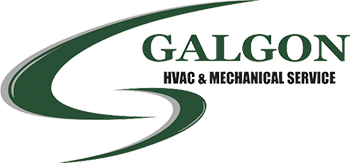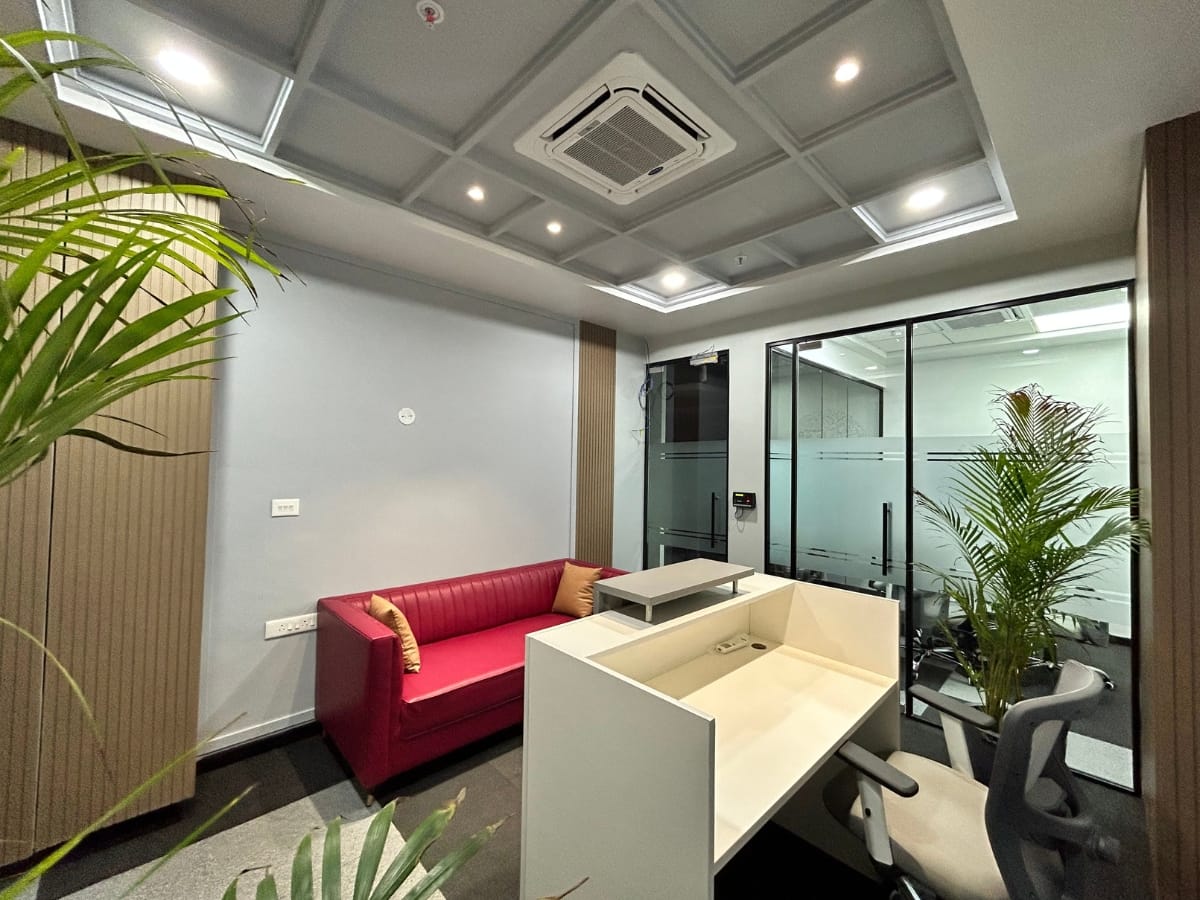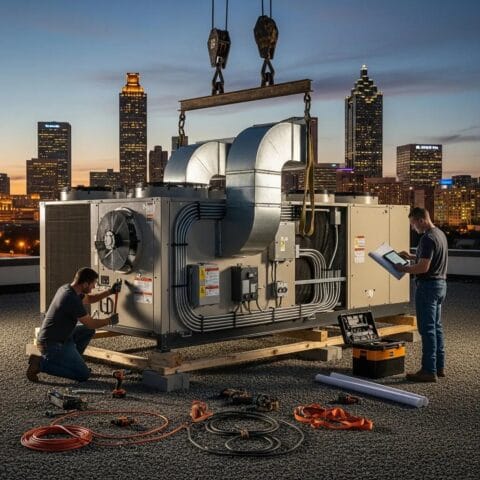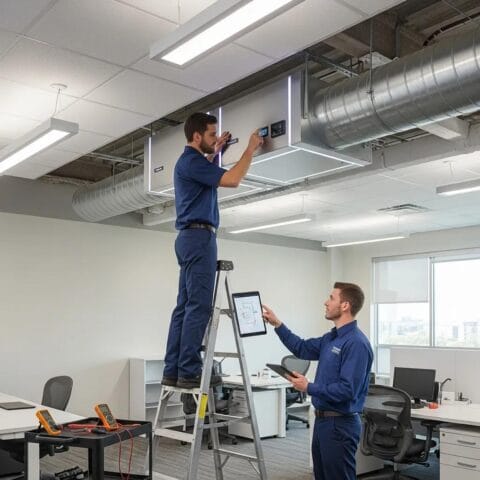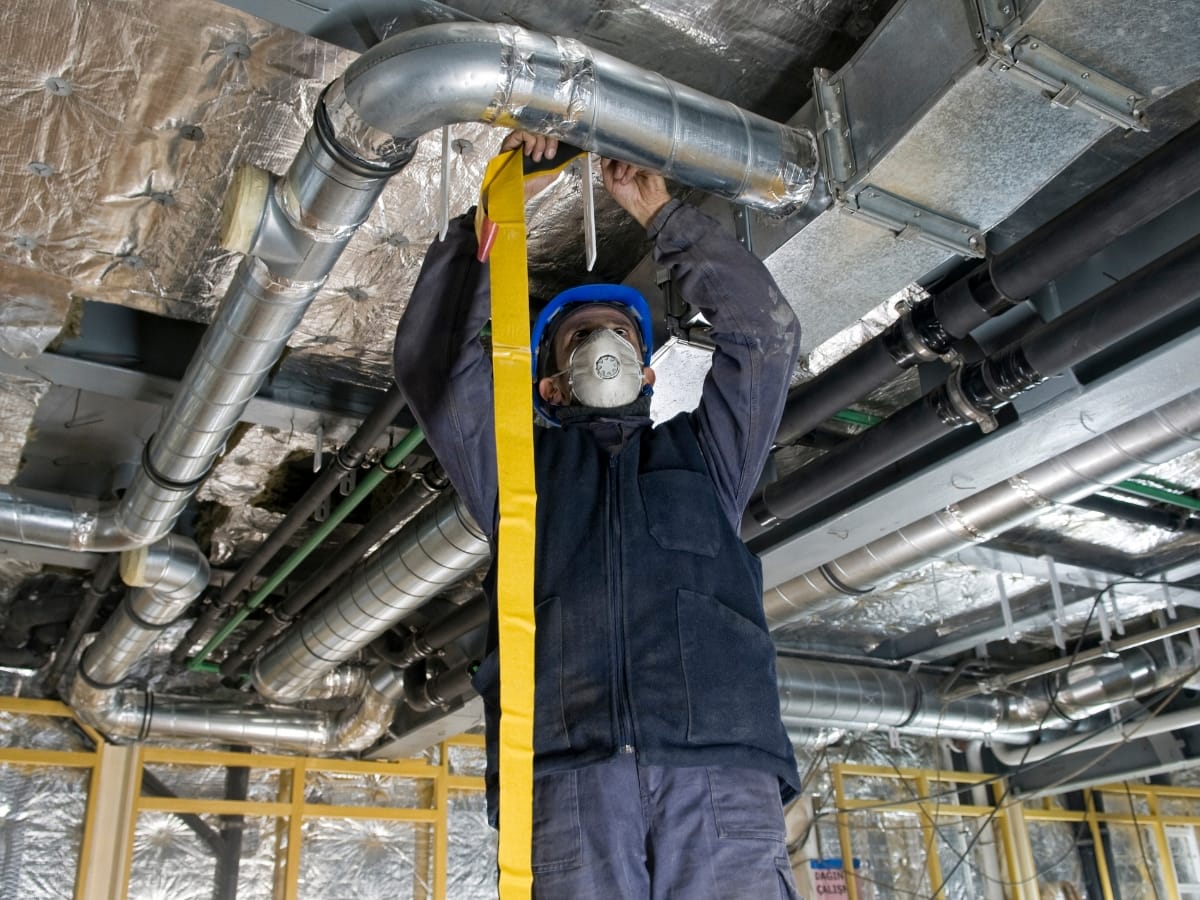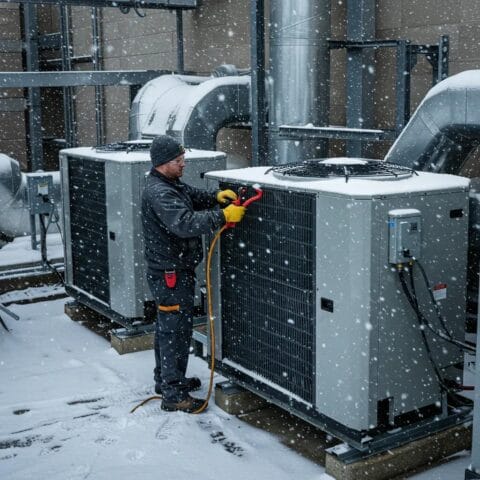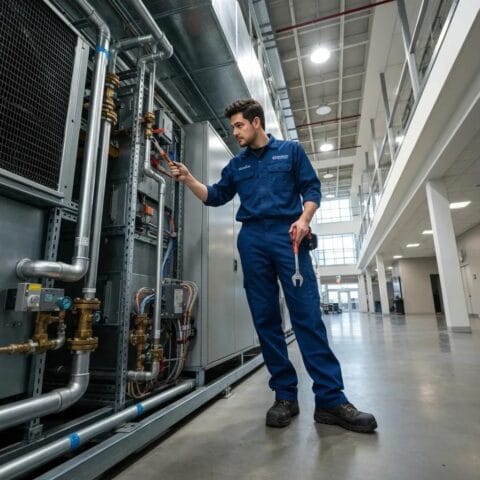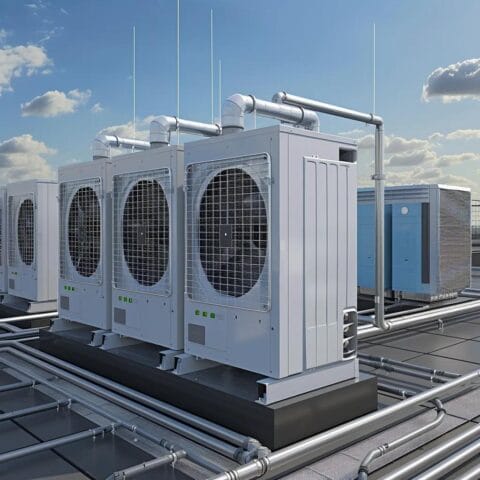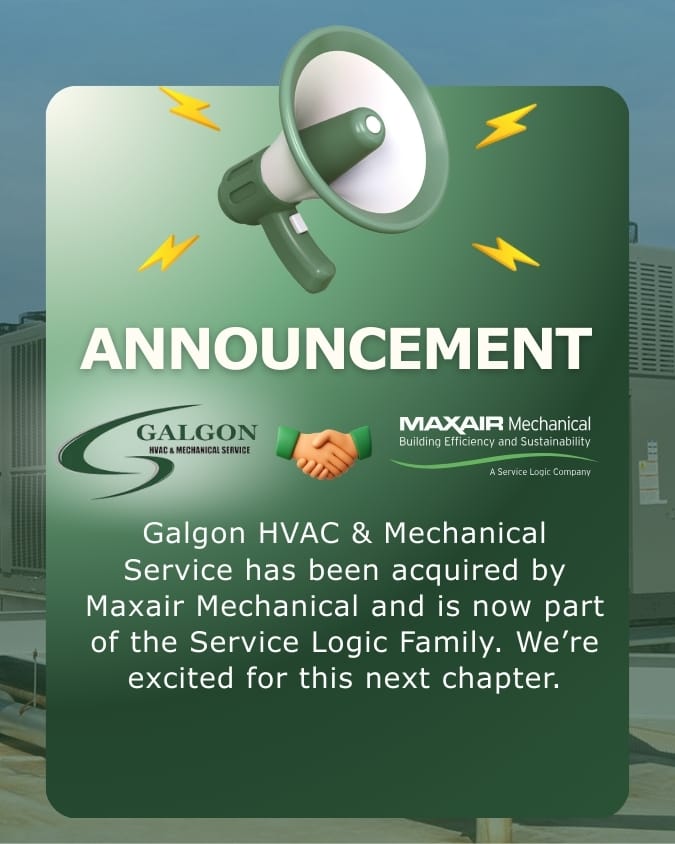Atlanta businesses face rising energy costs. This article explores energy-efficient commercial HVAC solutions that can reduce expenses and improve comfort. We’ll examine cutting-edge technologies, evaluate cost-effectiveness, and discuss local regulations. Readers will learn how to select the right HVAC contractor and maintain their systems for optimal efficiency. By implementing these energy-efficient commercial HVAC solutions, businesses can lower operating costs and create more comfortable environments for employees and customers.
Upgrade Your Business with Energy-Efficient Commercial HVAC Solutions
Exploring Energy-Efficient Commercial HVAC Solutions for Atlanta Businesses

Energy-efficient commercial HVAC solutions are crucial for Atlanta businesses and HVAC industries, given the city’s climate challenges. These systems enhance sustainability, improve customer experience, and optimize temperature control. By focusing on air conditioning efficiency and waste heat recovery, companies can reduce energy consumption while maintaining comfort. The growing careers in energy-efficient HVAC systems highlight their importance in Atlanta’s unique environment.
Overview of Energy Efficiency in HVAC Systems
Energy efficiency in HVAC systems is paramount for Atlanta businesses, particularly in light of climate change and increasing energy costs. Efficient systems not only reduce energy consumption, but also effectively manage humidity levels and filter pollutants, creating a healthier indoor environment. By optimizing compressor performance and implementing smart controls, businesses can significantly lower their carbon footprint while maintaining comfort.
The unique climate of Atlanta presents challenges that require tailored HVAC solutions. Designing and installing energy-efficient systems helps businesses combat high humidity and extreme temperature fluctuations. These advanced systems utilize innovative technologies to balance energy use with performance, ensuring optimal indoor air quality and temperature control while minimizing operational costs.
Importance of Energy Efficiency for Atlanta’s Climate
Atlanta’s climate demands energy-efficient HVAC solutions to combat high temperatures and humidity while reducing greenhouse gas emissions. The importance of environmentally friendly systems that minimize earth’s resource consumption cannot be overstated. By implementing advanced technologies, businesses can significantly reduce their carbon footprint and contribute to a greener future.
The manufacturing sector in Atlanta particularly benefits from energy-efficient HVAC systems, as they help maintain optimal working conditions while reducing operational costs. Designing and installing these systems ensures businesses can achieve both comfort and sustainability goals.
Key Energy-Efficient HVAC Technologies for Commercial Spaces
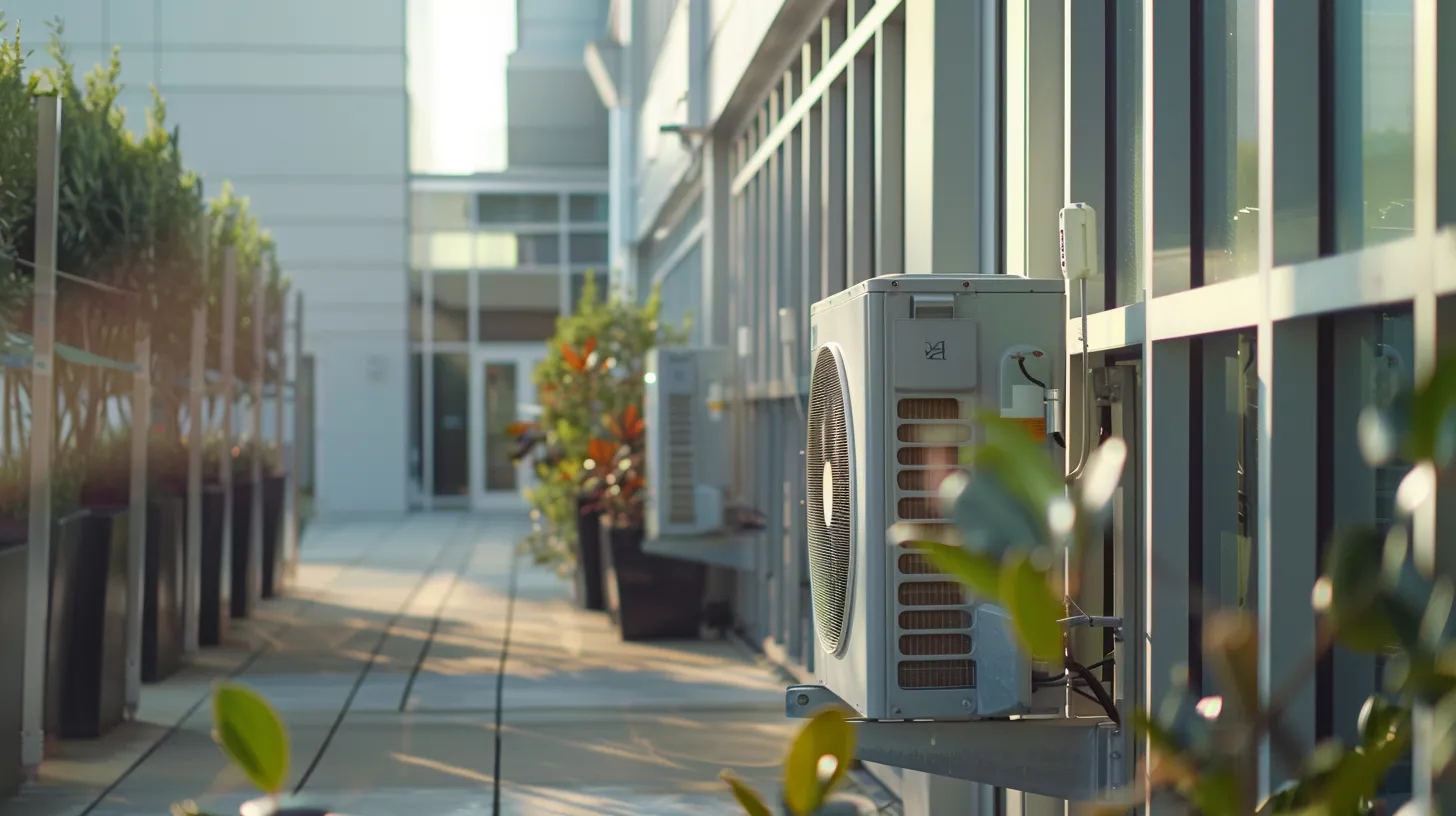
Energy-efficient HVAC technologies are transforming commercial spaces in Atlanta. Variable refrigerant flow systems offer substantial cost savings, while high-efficiency heat pumps provide optimal performance. Smart thermostats and automation enhance control, reducing carbon footprints and improving regulatory compliance. These innovations, combined with advanced filtration and predictive maintenance, ensure optimal indoor air quality and system longevity for Atlanta businesses.
Variable Refrigerant Flow (VRF) Systems for Cost Savings
Variable Refrigerant Flow (VRF) systems represent a significant innovation in HVAC technology, offering Atlanta businesses substantial cost savings through improved efficiency and airflow management. These systems allow for precise temperature control in multiple zones, reducing energy waste and operational costs while maintaining optimal comfort levels throughout commercial spaces.
The implementation of VRF systems aligns with energy efficiency policies, enabling businesses to meet stringent regulatory requirements. By utilizing advanced refrigerant control and variable-speed compressors, VRF technology adapts to changing cooling and heating demands, resulting in lower energy consumption and reduced environmental impact for Atlanta’s commercial sector.
High-Efficiency Heat Pump Options in Atlanta
High-efficiency heat pumps offer Atlanta businesses an energy-efficient solution for temperature control in varying climate conditions. These systems excel in both heating and cooling, adapting to Atlanta’s fluctuating weather patterns while minimizing energy consumption. By leveraging advanced technology, heat pumps provide consistent comfort and reduce operational costs for commercial spaces.
The market for high-efficiency heat pumps in Atlanta continues to grow as businesses prioritize energy conservation and sustainable practices. These systems work in tandem with proper building insulation to optimize performance and further reduce energy expenditure. For Atlanta companies seeking to improve their HVAC efficiency, high-efficiency heat pumps present a compelling option:
- Versatile performance in heating and cooling modes
- Reduced energy consumption compared to traditional systems
- Compatibility with existing building infrastructure
- Potential for significant long-term cost savings
- Contribution to overall sustainability goals
Smart Thermostats and Automation for Enhanced Control
Smart thermostats and automation systems enhance control over commercial HVAC operations in Atlanta. These advanced technologies allow engineers to optimize temperature settings, monitor energy consumption, and integrate with lighting and chiller systems. By leveraging real-time data and predictive algorithms, smart thermostats can adjust HVAC performance based on occupancy patterns and weather conditions.
Automation in commercial HVAC systems extends beyond thermostats to include pipe networks and air handling units. This comprehensive approach enables precise control over airflow, humidity, and temperature across different zones in a building. The result is improved energy efficiency, reduced operational costs, and enhanced comfort for occupants. Here’s a breakdown of the benefits:
Saving energy matters. Let’s look at the costs and see if it’s worth it.
Evaluating the Cost-Effectiveness of Energy-Efficient HVAC Solutions

Evaluating the cost-effectiveness of energy-efficient HVAC solutions involves analyzing initial investments against long-term savings. Case studies of Atlanta businesses demonstrate tangible benefits, including reduced energy consumption and improved occupancy comfort. Factors such as Energy Star ratings, refrigerant efficiency, and construction considerations play crucial roles in determining overall system value and performance.
Initial Investment Versus Long-Term Savings
The initial investment in energy-efficient HVAC solutions for Atlanta businesses often includes advanced heat exchangers and high-performance pumps. While these components may increase upfront costs, they significantly reduce long-term energy consumption. Businesses must consider factors such as sunlight exposure and roof conditions when evaluating system placement for optimal efficiency.
Regulatory compliance plays a crucial role in the cost-benefit analysis of energy-efficient HVAC systems. Atlanta companies that invest in advanced technologies not only benefit from reduced operational expenses but also position themselves favorably in light of evolving energy regulations. The long-term savings potential of these systems becomes evident when considering the following factors:
- Reduced energy bills due to improved system efficiency
- Lower maintenance costs from high-quality components
- Potential tax incentives for energy-efficient upgrades
- Increased property value through modernized HVAC infrastructure
- Enhanced occupant comfort leading to improved productivity
Case Studies of Local Businesses Benefiting From Energy-Efficient Systems
A recent case study of an Atlanta office complex revealed significant benefits from upgrading to an energy-efficient HVAC system. The building’s energy consumption decreased by 30%, resulting in substantial cost savings and a reduced carbon footprint. This information demonstrates the tangible advantages of investing in modern HVAC technologies for commercial spaces in the region.
Another notable example is a local manufacturing facility that implemented a smart HVAC system with advanced controls. The new system optimized resource usage based on occupancy patterns and production schedules, leading to a 25% reduction in energy costs. This case highlights how tailored energy-efficient solutions can address the unique needs of different businesses while delivering measurable improvements in operational efficiency.
After evaluating costs, the real game begins. Local rules and incentives can make or break your energy-saving plans.
Understanding Local Regulations and Incentives for Energy Efficiency

Atlanta businesses can benefit from energy-efficient HVAC solutions by understanding local regulations and incentives. Available tax credits and rebates specific to Atlanta encourage the adoption of advanced technologies like variable refrigerant flow systems and programmable thermostats. Compliance with Atlanta’s energy codes and standards ensures businesses meet regulatory requirements while optimizing their HVAC systems for efficiency and performance.
Available Tax Credits and Rebates Specific to Atlanta
Atlanta businesses can take advantage of various tax credits and rebates for implementing energy-efficient HVAC solutions. These incentives often cover upgrades to evaporator systems and retrofitting older equipment with more sustainable energy technologies. By leveraging these programs, companies can offset the initial costs of installing high-efficiency gas-powered systems or electric heat pumps.
Local utility providers offer rebates for commercial customers who invest in energy-saving HVAC equipment. These programs aim to reduce overall energy consumption and promote sustainable practices across the city. Businesses that demonstrate significant improvements in energy efficiency through retrofitting or installing new systems may qualify for additional incentives, further enhancing the long-term value of their HVAC investments.
Compliance With Atlanta’s Energy Codes and Standards
Atlanta’s energy codes and standards require commercial buildings to implement energy-efficient HVAC systems and building automation technologies. These regulations aim to reduce greenhouse gas emissions and promote sustainable infrastructure development. Compliance involves integrating energy recovery systems, optimizing cooling towers, and enhancing overall system efficiency to meet stringent performance benchmarks.
Businesses must navigate complex requirements for HVAC equipment, insulation, and controls to ensure their commercial spaces adhere to local energy codes. Proper documentation and regular audits are essential for maintaining compliance and avoiding penalties. By embracing these standards, Atlanta companies can achieve significant energy savings while contributing to the city’s sustainability goals.
Energy efficiency regulations shape the landscape. Regular maintenance keeps the savings flowing.
The Role of Maintenance in Sustaining Energy Efficiency
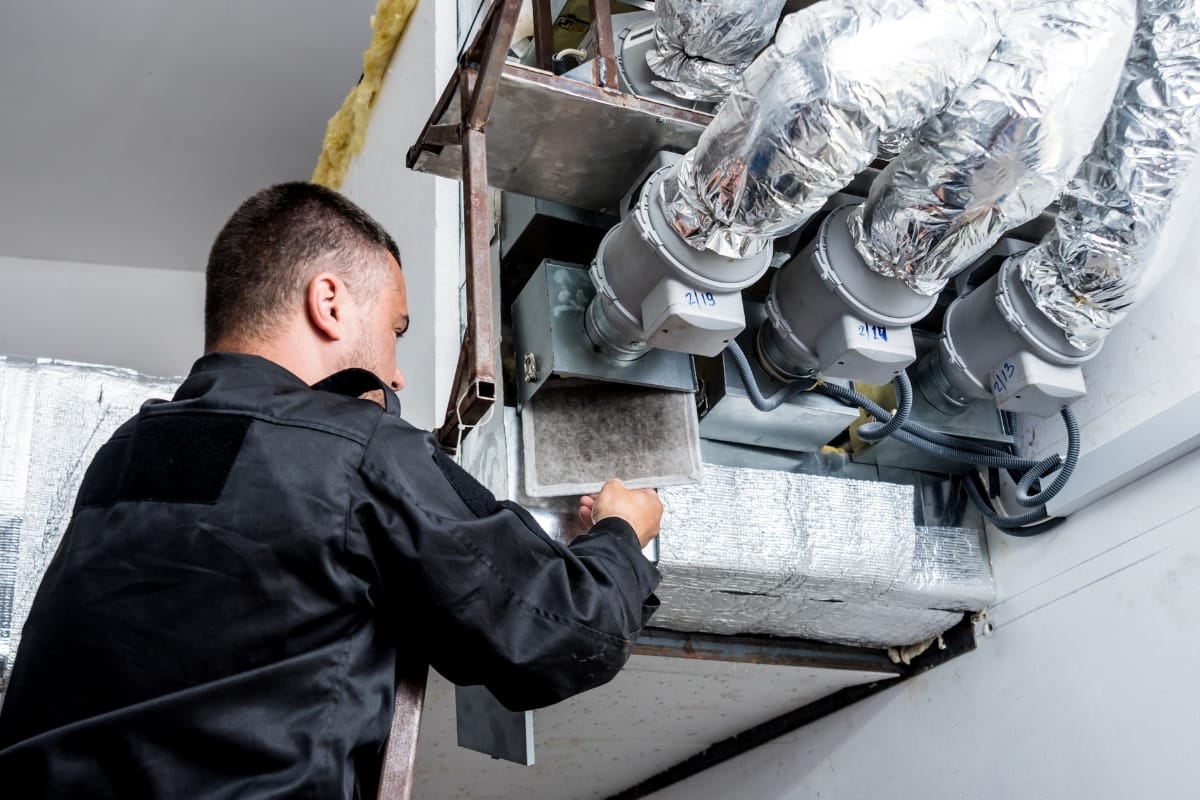
Regular maintenance is crucial for sustaining energy efficiency in commercial HVAC systems. Proper upkeep enhances cooling and heating performance, optimizes zoning, and improves productivity. In Atlanta’s unique climate, maintaining HVAC systems requires specific strategies. Data analysis of system performance helps identify areas for improvement, ensuring efficient operation across every floor of a building.
Importance of Regular Maintenance Checks
Regular maintenance checks play a crucial role in sustaining the energy efficiency of commercial HVAC systems in Atlanta. These inspections ensure optimal performance, reducing energy consumption and costs associated with inefficient operation. By identifying and addressing issues early, businesses can maintain their green building status and minimize their environmental impact.
HVAC maintenance directly affects system longevity and performance. Properly maintained equipment consumes less energy, resulting in lower utility bills and reduced carbon emissions. Regular checks prevent minor issues from escalating into major problems, saving businesses significant repair costs in the long run. Key benefits of consistent HVAC maintenance include:
- Extended equipment lifespan
- Improved indoor air quality
- Enhanced system reliability
- Reduced energy consumption
- Lower operational costs
Tips for Maintaining HVAC Systems in Atlanta’s Weather
In Atlanta’s climate, maintaining HVAC systems requires careful attention to humidity control and energy efficiency. Regular cleaning of condensate drains and coils prevents mold growth and ensures optimal heat transfer, reducing energy expenses. Implementing radiant heating and cooling systems can complement traditional HVAC, offering improved comfort and potential for integrating renewable energy sources.
Proper insulation and weatherization are essential for maximizing HVAC efficiency in Atlanta’s variable weather. By addressing air leaks and improving building envelope performance, businesses can significantly reduce their HVAC load and increase their return on investment. Real estate owners should consider scheduling bi-annual maintenance checks to align with Atlanta’s distinct cooling and heating seasons, ensuring peak system performance year-round.
Regular maintenance keeps systems running smoothly. Now, let’s explore how these efficient systems enhance indoor comfort.
Enhancing Indoor Comfort With Energy-Efficient HVAC

Energy-efficient HVAC systems enhance indoor comfort in Atlanta businesses, significantly impacting employee productivity and satisfaction. These advanced systems, including optimized air handlers and well-maintained ducts, improve indoor air quality by reducing waste and managing equipment effectively. Strategies for enhancing air quality focus on proper filtration, ventilation, and humidity control, ensuring a healthier work environment.
Impact on Employee Productivity and Satisfaction
Energy-efficient HVAC systems significantly impact employee productivity and satisfaction in Atlanta businesses. By maintaining consistent temperatures and optimal humidity levels, these advanced systems create a comfortable work environment that enhances focus and reduces fatigue. The integration of Internet of Things (IoT) technology allows for precise control and monitoring of indoor conditions, ensuring that employees remain comfortable regardless of external weather fluctuations.
Investing in energy-efficient HVAC systems demonstrates a commitment to employee well-being, which can lead to increased job satisfaction and reduced absenteeism. These systems often incorporate superior air filtration and ventilation capabilities, improving indoor air quality and reducing the spread of airborne contaminants. As a result, employees experience fewer health issues related to poor air quality, leading to increased productivity and a more positive work atmosphere.
Strategies for Improving Indoor Air Quality
Improving indoor air quality in Atlanta’s commercial buildings requires effective ventilation strategies. Energy-efficient HVAC systems incorporate advanced filtration and air exchange mechanisms, ensuring a steady supply of fresh air while minimizing energy consumption. These systems often utilize heat recovery ventilators to precondition incoming air, reducing the load on heating and cooling equipment.
Water-based air purification technologies are gaining traction in energy-efficient HVAC solutions. These systems remove airborne contaminants while helping to maintain optimal humidity levels, creating a healthier indoor environment. By integrating smart controls, businesses can automate ventilation based on occupancy and air quality measurements, balancing comfort with electricity usage in their buildings.
Efficiency matters, but execution is key. Choosing the right HVAC contractor can make or break a business’s comfort and bottom line.
Selecting the Right HVAC Contractor for Atlanta Businesses

Selecting the right HVAC contractor is crucial for Atlanta businesses seeking energy-efficient solutions. This section examines how to evaluate a contractor’s experience with efficiency projects and the importance of certifications and industry partnerships. These factors directly impact indoor air quality, heating and cooling performance, and potential tax benefits, while also influencing employment opportunities in the HVAC sector.
Evaluating Experience With Energy Efficiency Projects
When evaluating HVAC contractors for energy efficiency projects, Atlanta businesses should assess their experience with facility management and geothermal heating systems. Contractors well-versed in these areas can provide valuable insights into optimizing HVAC performance while reducing air pollution and utility costs. Their expertise ensures that commercial spaces benefit from the latest energy-saving technologies and practices.
Experienced contractors understand the intricacies of integrating energy-efficient furnaces and cooling systems with existing building infrastructure. They can recommend solutions that balance comfort with energy conservation, considering factors such as building size, occupancy patterns, and local climate conditions. This expertise translates into more effective HVAC installations that maximize energy savings and minimize environmental impact.
Importance of Certifications and Industry Partnerships
Certifications and industry partnerships play a crucial role in selecting the right HVAC contractor for energy-efficient solutions in Atlanta workspaces. Contractors with relevant certifications demonstrate expertise in energy conservation techniques and compliance with industry standards. These qualifications ensure that businesses can maximize potential tax credits while implementing cutting-edge HVAC technologies.
Strong industry partnerships enable contractors to stay current with the latest advancements in solar energy integration and energy-efficient HVAC systems. These connections often translate to more comprehensive solutions for commercial clients, including innovative approaches to reducing energy consumption. Businesses can benefit from contractors who leverage these partnerships to provide tailored recommendations, often communicated efficiently via email, streamlining the decision-making process for energy-efficient upgrades.
Frequently Asked Questions
What are the primary energy-efficient HVAC technologies for commercial buildings in Atlanta?
Commercial buildings in Atlanta can benefit from several energy-efficient HVAC technologies. These include variable refrigerant flow systems, high-efficiency chillers, geothermal heat pumps, advanced building automation systems, and energy recovery ventilators. These technologies optimize cooling and heating while reducing energy consumption and operating costs.
How can businesses evaluate the cost-effectiveness of energy-efficient HVAC solutions?
Businesses can evaluate the cost-effectiveness of energy-efficient HVAC solutions by analyzing initial investment costs, projected energy savings, maintenance expenses, and long-term operational benefits. A comprehensive assessment should consider factors like equipment lifespan, utility rates, and potential incentives or rebates to determine overall return on investment.
What local regulations and incentives exist for energy-efficient HVAC in Atlanta?
Atlanta offers various incentives for energy-efficient HVAC systems, including rebates from Georgia Power and tax credits for qualifying equipment. Local regulations require compliance with energy codes, while some jurisdictions mandate periodic energy audits for commercial buildings to promote efficiency and sustainability.
How does regular maintenance contribute to HVAC energy efficiency?
Regular HVAC maintenance enhances energy efficiency by keeping components clean, lubricated, and properly adjusted. This reduces strain on the system, optimizes airflow, and ensures efficient heat transfer. Well-maintained units consume less energy, leading to lower utility bills and extended equipment lifespan.
What factors should businesses consider when selecting an HVAC contractor in Atlanta?
When selecting an HVAC contractor in Atlanta, businesses should consider factors such as licensing, experience, reputation, response time, and familiarity with commercial systems. It’s crucial to choose a company that offers 24/7 emergency services, prioritizes energy efficiency, and provides comprehensive maintenance plans tailored to the business’s specific needs.
Conclusion
Energy-efficient commercial HVAC solutions are crucial for Atlanta businesses, offering substantial benefits in cost savings, environmental sustainability, and indoor comfort. These advanced systems, including variable refrigerant flow and high-efficiency heat pumps, coupled with smart thermostats and automation, enable precise control and optimization of energy consumption while maintaining optimal indoor conditions.
With tailored systems designed to optimize performance and lower energy consumption, your business can thrive in Atlanta’s competitive market. Trust Galgon HVAC & Mechanical Service to provide the innovative, cost-effective commercial HVAC solutions you need. Contact us today at (404) 352-1500 or request a service or quote through our site form and start transforming your business environment for sustainable success.
